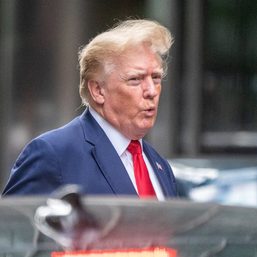SUMMARY
This is AI generated summarization, which may have errors. For context, always refer to the full article.

MANILA, Philippines – Global legal systems may already be late in holding big tech companies accountable for the harm that they enable, but if there’s one place leading the charge, that may be the European Union.
“There has been a failure of leadership and action in most parts of the world. I give the EU a lot of credit for trying to tackle a range of issues posed by technology, particularly social media,” said former United States secretary of state Hillary Rodham Clinton.
Speaking at Rappler’s Social Good Summit on September 16, Clinton warned that the technology companies that dominate our daily lives have been left largely unregulated, allowing them to make money while “stripping us of our democracy, our citizenship, rights and obligations.”
The EU, however, has begun to challenge the grip of these big tech giants with bold new regulations. Facebook, Google, and TikTok, among others, will soon have to comply with the unprecedented Digital Services Act – a set of rules that hope to stop the spread of harmful content online and prohibit advertisers from targeting vulnerable people, like children.
As an example of the influence that these new EU laws exert, the Digital Markets Act, which aims to address large tech companies’ control over the market, was seen as a reason why Meta’s Threads was not launched in the EU.
Clinton praised this move to regulate big tech companies, hailing the EU as the “only entity globally that has really taken a lot of steps to try to rein in the worst abuses of technology.”
And it seems to be working, to an extent. Some tech companies have already added more options to report content that’s illegal or in violation of policies. For instance, TikTok – which has gained notoriety for hosting misinformation and “dangerous” content – said that it has now added a team of moderators to determine whether content flagged by users should be removed.
American politics
If the implementation of the EU’s rules go well, then other countries around the world may look toward it as a template. But back in her home country, Clinton said that challenges await efforts to legislate similar laws.
For one, the veteran democratic said that the US’ “divided politics” could get in the way. Republicans may have differing views on how to confront disinformation, which helped the party and Donald Trump secure a close win in the 2016 presidential campaign.
“We know that certainly Donald Trump – and everything we know about him – is a very willing user of disinformation and propaganda and incitement. And now, of course, he’s back on the platforms to be able to try to find enablers and allies,” Clinton said, who had been at the center of disinformation attacks in 2016, when she faced off with Trump.
“I hope we will have a vigorous Republican Party at some point that is not founded on lies and disinformation,” she added.
As the upcoming presidential election creeps closer, US authorities face mounting pressure to prevent big tech companies from enabling disinformation to spread. Worryingly, advancements in artificial intelligence – which Clinton noted that even the EU has yet to figure out how to regulate – may enable disinformation to spread at a scale and speed never seen before. (READ: AI-enabled disinformation: Waging an unviable war of scale)
The EU is crafting its AI policies through the AI Act – first proposed in 2021, and approved by the EU Parliament in June 2023, but is not yet enacted into law.
In response, the former secretary of state believes that the US has to bring more technology experts and practitioners onto the side of legislative reforms before it’s too late.
“I hope that our government – on a bipartisan basis, and that’s what I would really love to see – will take some action before the 2024 election,” Clinton said. – Rappler.com
Add a comment
How does this make you feel?












![[ANALYSIS] How to turn tech for good? Governments should take initiative](https://www.rappler.com/tachyon/2023/09/tl-tech-for-good.jpg?resize=257%2C257&crop_strategy=attention)

There are no comments yet. Add your comment to start the conversation.